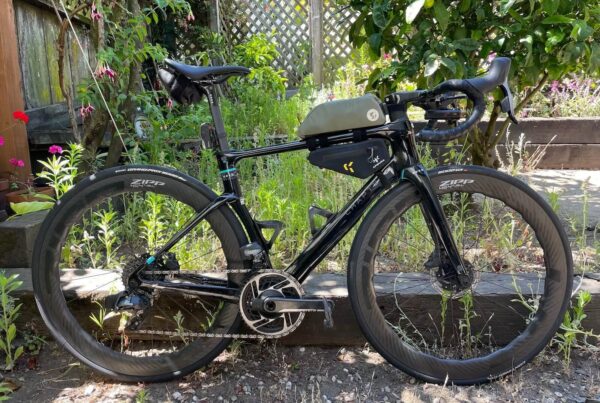Katelin Richardson had just graduated from Springfield College in Massachusetts, and was staying to pursue a doctorate in physical therapy. But first, Kate, an athletic young woman who played soccer in high school and college, was spending the summer of 2011 guiding rafting trips on Tennessee’s Little Pigeon River.
On the evening of July 12, she and Rachel Warren, then 19, rode fifteen miles into Newport for dinner. They were on their way home when everything changed in an instant.
“We were going down a straight hill with a small grade,” said Warren in the Knoxville News Sentinel. “I pulled ahead of her about 20 feet. I was making a joke about how I bike alone a lot and recite poetry. I said something about how I didn’t have to do that anymore, because now I had her to bike with. I quoted the first line of “Howl” by Allen Ginsberg: ‘I saw the best minds of my generation destroyed by madness…’”
Warren looked back to see if Richardson was laughing. Instead, Kate was pinned to the hood of the pickup truck that had just hit her. The truck sped past and continued for another hundred feet before Kate fell from the hood. The driver dragged Kate for another two hundred feet before he finally came to a stop.
Horrified by what she had just witnessed, Warren raced ahead, chasing the pickup truck that was dragging her friend down the highway. She finally caught up to the truck, and found that her friend still had a pulse, but had stopped breathing. “I kept yelling for help, particularly for the car in front of us,” she said. “I remember this overwhelming sense of compassion for him. I’m thinking he may have just killed someone. I expected him to come out of the car apologizing.”
But the driver didn’t get out. He just sat there in his truck, waiting. “I waited there with her. Eventually, a woman drove up from behind, stopped the car, got out,” Warren said. “She kind of took control.”
Richardson was airlifted to a hospital, but died before the flight was over. She was 21 years old.
The driver, 73-year old Dan Ford, failed several field sobriety tests, and a blood-alcohol test showed that he was legally over the limit. Ford was arrested and charged with driving under the influence, vehicular homicide by intoxication, and reckless vehicular homicide. The next day, he posted a $50,000 bond and was freed from jail.
Ford wasn’t just anybody; a prominent business owner, he was also a former chair of the Cocke County Republican Party, a former candidate for state representative, and an election commissioner. He was the classic big fish in a small pond. The crash that took Richardson’s life was Ford’s first alleged DUI, but not his first brush with the law. In addition to a couple of traffic violations—following too closely and improper passing—he had previously been charged with aggravated criminal trespassing and carrying a prohibited weapon on separate occasions. Both charges were dismissed.
Because of Ford’s prominence, a former District Attorney was appointed as a special prosecutor in the case, and a specially appointed judge was assigned to handle the case after the Cocke County General Sessions Judge recused himself.
As a condition of his bail, Ford had been ordered to abstain from alcohol and install an ignition interlock device on the truck. Three months later, Ford was in court; his ignition interlock device had detected alcohol on the driver’s breath on two separate occasions. But Ford’s wife and son testified that it was they, and not Ford, who had triggered the device. Ford’s bail was not revoked, but he was ordered to wear an alcohol-monitoring ankle bracelet.
Although Ford had been driving under the influence the night he killed Katelin Richardson, the two cyclists’ own behavior began to be called into question. They had not been wearing helmets, but that was not illegal, and the accident investigation concluded that a helmet would not have saved Richardson. She had been taking the lane, but that was legal, and the two cyclists were on a bicycle route; residents noted that the road doesn’t have a lot of traffic, especially after dark.
There was one problem, though, that would be more difficult to overlook. The collision occurred after sunset, but neither cyclist had been properly equipped with lights. Richardson was wearing a black backpack, and other drivers reported that they had barely missed hitting her. “Under all of the evidence, there was a serious question raised as to whether this collision was a result of his intoxication, or of her not being visible,” the special prosecutor noted.
On May 13, 2013, Dan Ford pleaded guilty to vehicular homicide by recklessness and driving under the influence of alcohol; the vehicular homicide by intoxication charge was dismissed as part of a plea bargain. Ford originally faced up to 12 years in prison, but with the plea deal, Ford was looking at six years maximum. But small ponds don’t hand out the maximum to big fish.
At sentencing, Ford was given a five-year deferred sentence. For at least two years, he will be under supervised probation; he must complete 800 hours of community service, his license was revoked for three years, and he must attend DUI school. If he meets those requirements, he will be eligible for unsupervised probation for the remainder of his five-year term.
He was sentenced to 48 hours in jail for the DUI, which he promptly served.
But still, there is a felony conviction on his record—which he is seeking to expunge after his five-year sentence is completed. Depending on how the law is interpreted, he may succeed.
Richardson’s parents agreed to the plea bargain, but their quest for justice is not over. They have filed an $11 million civil suit against Ford.
Meanwhile, Richardson’s memory lives on. It had been her dream to bring soccer equipment to underprivileged children in Africa. With the help of Smoky Mountain Outdoors owner Daniel Jennette, Richardson’s fellow river guides, friends, and family, Katelin’s dream has been realized in Ghana with the Katelin Richardson Memorial Soccer Field at a children’s village operated by the City of Refuge Ministries, an organization that rescues children sold into slavery.
Research and assistance by Rick Bernardi, J.D.
This article, A Big Fish That Got Away, was originally published on Bicycling on June 10, 2013.



